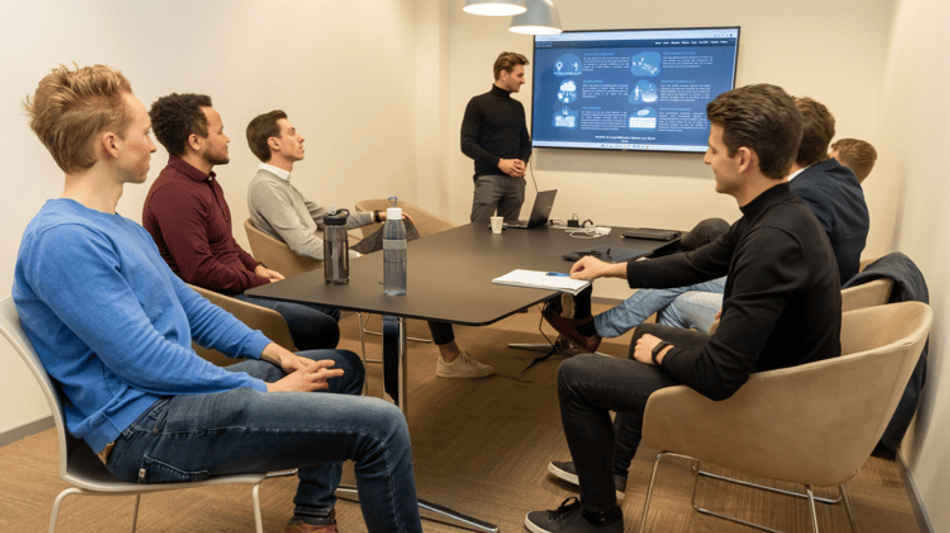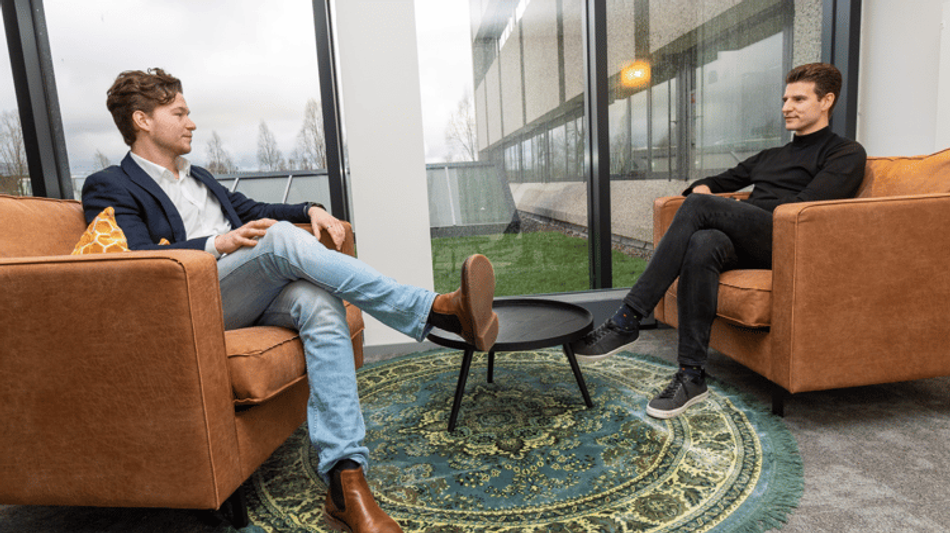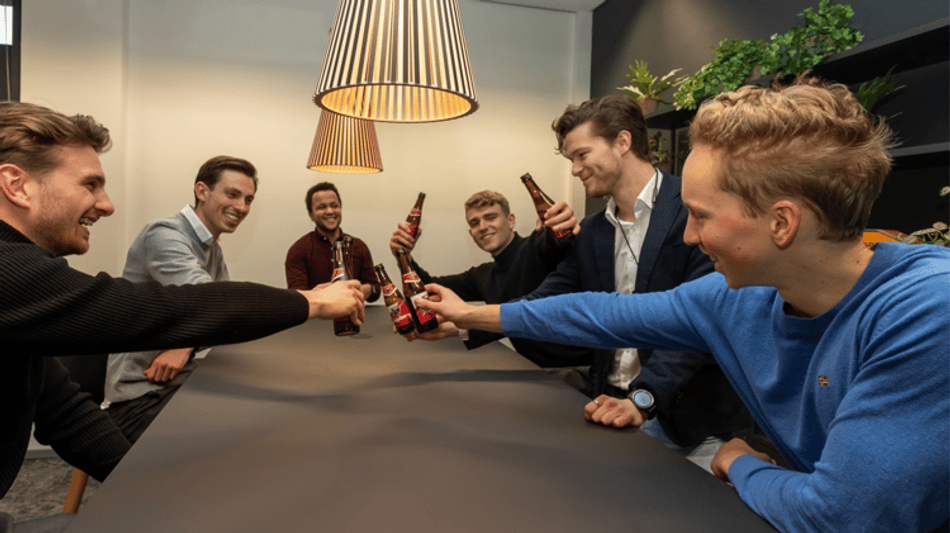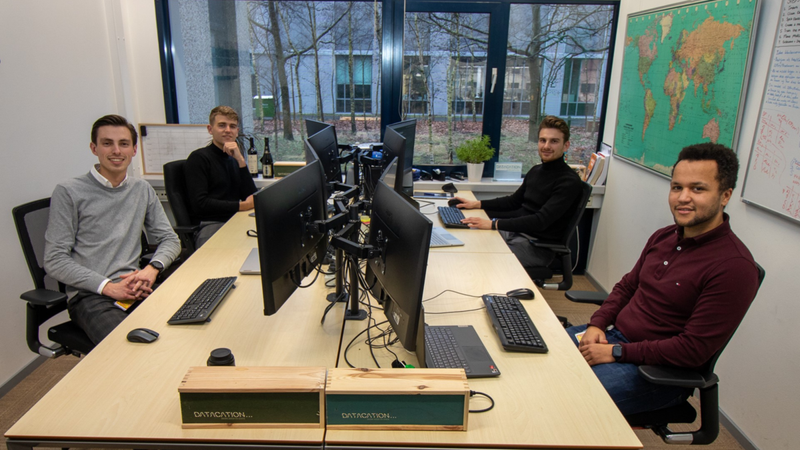Datacation: 'IT nerds' using data science to change everything from cancer diagnosis to car maintenance
Datacation is a startup in a technology area so advanced it can't even be called 'next-generation'. Perhaps 'next next gen' because so far we don't know all the possible business applications of machine learning and AI, nor do we know the limits.
Datacation is a startup in a technology area so advanced it can't even be called 'next-generation'. Perhaps 'next next gen' because so far we don't know all the possible business applications of machine learning and AI, nor do we know the limits. However, High Tech Campus Eindhoven-based Datacation - led by Ralf Zoetekouw - is already helping customers realize the potential of this new and ever-evolving technology.
What’s your background? Where did you go to school? How did your idea of Datacation start?
I grew up in Veldhoven, then went to Maastricht, in the southern part of the Netherlands, to study econometrics for both my bachelor’s and master’s degrees. During my studies, I started working as a data scientist for approximately three years. Later, the company I worked for merged with another company, and they asked me to set up a new data science department. That triggered me to start thinking, “Why shouldn’t I start a data science startup for my own?” I have always been curious about working in a large consultancy firm, but after hearing stories from my friends who worked at such places, it didn’t seem very appealing to me. I felt the need to create a team that learns together in a great atmosphere. That was my dream, to create a sense of dedication. My ultimate goal was to create a team of young and ambitious people with a passion for data science and bring them together here at the High Tech Campus.
Where does machine learning stop, and artificial intelligence begin?
Good question. In short, AI is a very broad phenomenon and a lot of things are part of AI. AI is a mechanism where the computer executes tasks that normally only human beings are able to do. Despite the media attention AI is getting lately, it still is in the very early stages of development. Machine learning, on the other hand, is part of AI and applies self-learning. An agent, for example a self-driving car, learns to familiarize itself with its environment by identifying causal relations of its behavior in the environment that it is applied in. When it sees an obstacle, it can recall the effect of previous actions in similar situations and decide according to the most beneficial outcome … which is, of course, to drive around the obstacle. As the agent is gathering more data, the Machine Learning model(s) become more and more accurate, allowing the agent to continuously improve its performance.

Your biggest potential market is in banking, financial markets and predictive analysis. But is Datacation active in other industries?
We are active in a lot of different industries besides the financial industry. For example, education, medical, retail, agriculture, manufacturing and sports. One of our projects in the medical domain is an application that is able to detect pancreatic cancer at an earlier stage and in a more accurate way using computer vision on CT Scans. Examples of other projects include optimization algorithms for forecasting of meeting room bookings, the automatic reading of vehicle registration certificates and text on car tires, the prediction of market-based prices of garages for car maintenance and repairs, generating the essential text data from millions of emails, building recommendation systems for food delivery platforms and fan shops, advising a data strategy plan and visualizing data in dashboards for multiple applications.
Let’s clarify exactly what products or services you produce. There's the hardware and there's the analysis. Do you build software as well?
We have four kinds of services. The first is a Quick Scan. We look at the business difficulties or challenges companies face and want to solve. By placing the organization on our data maturity model, we can define the current state of data-driven work and distinguish opportunities for future growth. We analyze the model and look at the steps that need to be taken in the upcoming year, in the upcoming two years and in the upcoming three years in order to become more data driven. We provide our clients with data strategies and together we come up with a data strategy plan.
The data infrastructure is the building block of every organization and is the second service we offer. We extract raw data from different sources, process the data and make it useable for stakeholders within an organization for optimal data management. The work itself is not the most exciting work we do; however, it is one of the most fundamental pieces to begin the transition to becoming a data-driven company.
The third service we offer is providing data insights and data visualizations with Business Intelligence (BI) tools like PowerBI and Tableau. Once the data infrastructure is constructed efficiently and in a future-proof way, the organization can easily adjust their dashboards, which is called self-service BI. This way, we build a tool for them they can use for a lifetime and that provides valuable insights into their business. Lastly, we perform descriptive analysis and predictive analysis by implementing artificial intelligence. Our consultants have their own data science expertise, for example Natural Language Processing, Computer Vision, Deep (Reinforcement) Learning and Machine Learning.
To come back to your question, we are currently doing a variety of consultancy projects in a lot of different fields. In the future, we want to create product spin-offs and our own software. We have a couple of very cool ideas in the medical sector, the shipment industry and in the construction industry. One of the projects in which we are really making an impact is one with UMC Utrecht. Due to the underlying societal impact of this research, we want to dedicate our undivided attention to this project. Because of this, we are planning to create a new spin-off called Medication in the next year, which will focus on all projects related to the use of data in the medical domain.

Soon you might be working with many different companies and industries. How are you going to find the talent to do this? Or are you going to be focusing on one category? How do you decide which industry to pursue first?
We like to be active in as many industries as possible to see where we can make the most impact. Every two weeks, the team meets and I ask the question, “Imagine you could work at every company in the world (not being Datacation). Which company would you like to work for?” This gives us new ideas for acquisition. Our job is to get in touch with them, find a scalable solution and make these organizations more profitable. Out of the solutions we design, new Datacation spin-offs will emerge.
So, would you take on the project and then bring in the talent for it? Or do you bring in the talent and hope you have enough projects to keep them busy?
Right now, there are so many projects and the market demand for our data science and engineering solutions is very high, making it possible to constantly expand the team. A prerequisite for a new colleague is that he or she should have the “Datacation DNA.” We call ourselves “IT nerds with a social character.” It is extremely important data consultants have soft skills in addition to the necessary technical skills. This way, we bridge the gap between data and the business because we are able to explain difficult, technical, mathematical models in an understandable and accessible way. This creates a common understanding within the organization. We believe a project is only successful if the client's domain knowledge and our technical knowledge are combined in co-creation. It’s really important to know what the client is thinking. You have to put yourself in the shoes of the client, ask the right questions and see the potential business challenges they face.
In terms of like conventional degrees, who are you looking for? Who do you need?
We have a team of 12 consultants at the moment. We have MSc backgrounds in econometrics, mathematics, AI and machine learning, data science, computer science and industrial engineering. The variety in backgrounds is no coincidence, as your background will define the level of depth in which you can think with the client. So, we are open to all sorts of studies, as long as there is a significant inclination to the use of data in the domain you are specialized in. Besides the technical skills, soft skills are even more important. A typical workday at Datacation isn’t just writing code or solving complex problems, but you will most likely be communicating with clients as well. So, we’re looking for people with a background that includes the use of data, combined with the needed soft skills.
A fun fact is that we organize a DataTalk at our AI Innovation Center every Friday afternoon. During these talks, every colleague gets the chance to present something they think is interesting. This can be either about an AI topic or something completely different, as long as you present with passion. These presentations are quite laid back, as they are held with a well-deserved drink, pizza and often a lot of laughter. Also, almost every morning before the start of the stand-up, the Datacation team is active in the High Tech Campus gym. It would be great if a new colleague likes sports and wants to work out with us in the morning. But of course, that is not a must!

Do you see yourself expanding to the U.S. or other places?
We feel that if our work in the medical industry is successful in the Netherlands, it could be beneficial and help others in the rest of the world. For the consultancy side of the business, though, it is a bit harder to focus on a lot of different cities in Europe and the rest of the world. We're expanding to Amsterdam in October and adding our second office. We haven’t thought about moving internationally yet, although one of us has a dream to move to China for a while. So, who knows, Datacation China? Anyway, Amsterdam will be first, and then we will see what the future might bring.
